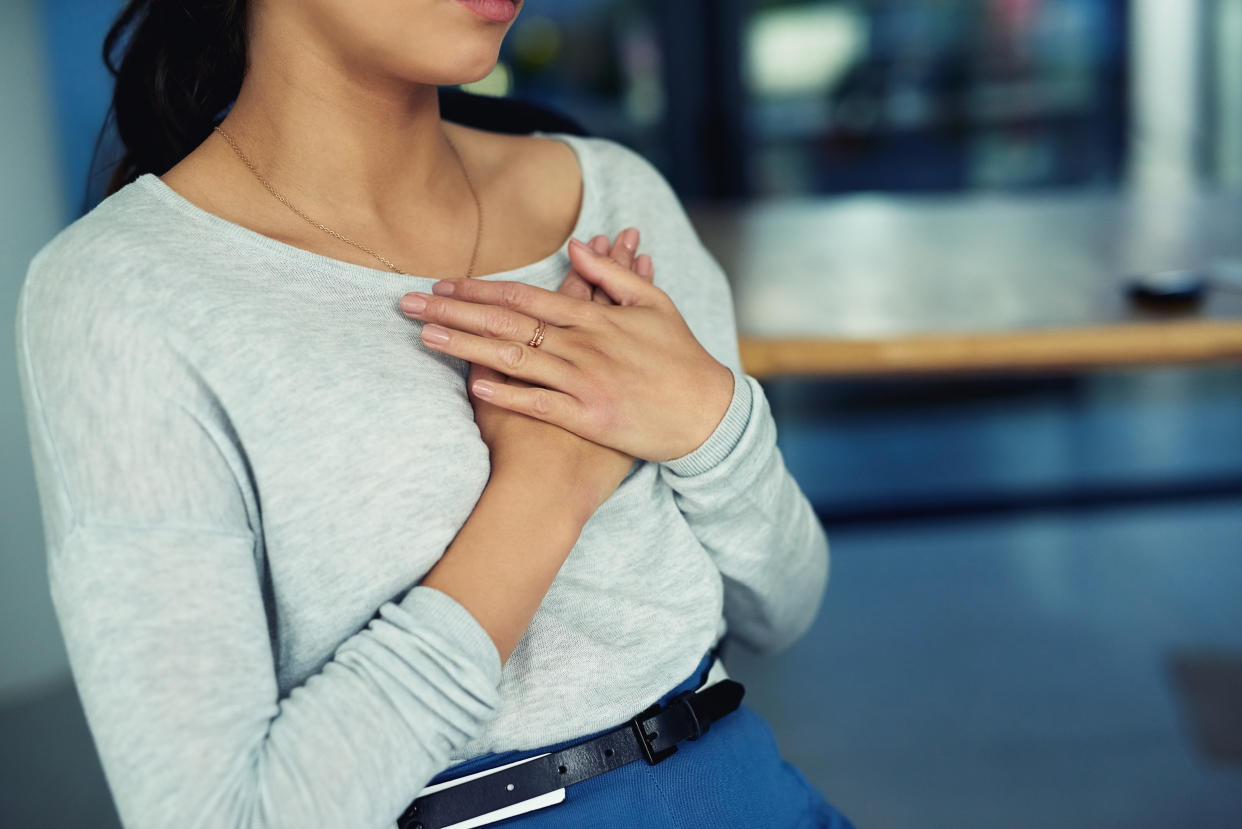This woman's 'muscle strain' ended up being a heart attack

One woman is sharing her heart attack symptoms on social media in hopes of letting other people know that women experience heart attacks differently from men.
The woman, a nurse who goes by the name Gwheezie, wrote extensively about her heart attack symptoms on Twitter. “Last Sunday I had a heart attack,” she wrote. “I had a 95% block in my left anterior descending artery. I’m alive because I called 911. I never had chest pain. It wasn’t what you read in pamphlets. I had it off & on for weeks,” she wrote.
I want to warn women our heart attacks feel different. Last Sunday I had a heart attack. I had a 95% block in my left anterior descending artery. I’m alive because I called 911. I never had chest pain. It wasn’t what you read in pamphlets. I had it off & on for weeks.
— gwheezie (@geewheezie) December 9, 2018
The nurse says “the pain ran across my upper back, shoulder blades & equally down both arms. It felt like burning & aching. I actually thought it was muscle strain. It wasn’t until I broke into drenching sweat & started vomiting that I called 911.” Gwheezie pointed out that she recently helped her neighbor clean out her barn and “thought I strained some muscles. I took Motrin & put a warm pack on my shoulders, I almost died because I didn’t call it chest pain.”
She even wrote off her symptoms the day before she had the actual attack and drove six hours to help her 90-year-old mother instead of seeing a doctor. “I thought … I’d just tough it out because it wasn’t real bad,” she said. The next day, things got much worse. “I was lucky, I had no idea what hospital to go to,” she wrote. “The female medics who picked me up took me to a hospital that does cardiac caths, I had 4 stents placed an hour after I got to the ER. That was Sunday. I was discharged thurs & at my daughters house & back to tweeting.”
I was lucky, I had no idea what hospital to go to, the female medics who picked me up took me to a hospital that does cardiac caths, i had 4 stents placed an hour after I got to the er. That was Sunday. I was discharged thurs & at my daughters house & back to tweeting.
— gwheezie (@geewheezie) December 9, 2018
Pain that comes and goes seems like a surprising symptom, but it’s actually “common for coronary artery disease and should be taken seriously,” Jennifer Haythe, MD, co-director of the Women’s Center for Cardiovascular Health at Columbia University Irving Medical Center and cardiologist at NewYork-Presbyterian/Columbia, tells Yahoo Lifestyle. “Chest pain is still the No. 1 symptom for men and women, and any symptoms of chest pain should prompt a visit to the emergency room,” she adds.
“Some women will experience some chest pain, but it may feel different than the typical ‘crushing pain’ men will describe,” women’s health expert Jennifer Wider, MD, tells Yahoo Lifestyle. Other women won’t have chest pain at all, she adds.
“Women are far more likely to develop atypical symptoms for a heart attack,” Haythe says, including nausea, vomiting, indigestion, shortness of breath, dizziness, fatigue, and arm, neck and back pain. Sanjiv Patel, MD, cardiologist at MemorialCare Heart and Vascular Institute at Orange Coast Medical Center in Fountain Valley, Calif., tells Yahoo Lifestyle there are ways to distinguish if the pain is heart-related. “If you have pain and it gets worse when you exert yourself, that’s more likely to be a sign of a cardiac issue,” Patel says. “If you have pain and difficulty breathing when you’re sitting and watching TV, you get up and walk around and it goes away, the pain is probably not related to your heart.”
How often it happens also matters, Patel says. If you have a minute or two of discomfort but it goes away and doesn’t happen again for several weeks, it’s probably not something to be alarmed about, he says. “But if you do something and it gets worse, and it comes back the next day for a longer period of time, you’ll want to see a doctor,” he says.
Unfortunately, it’s “unclear” why women tend to experience heart attacks differently from men, Haythe says. “There are a few hypotheses,” Wider says. “It could have to do with a difference in pain thresholds between men and women — women often blow off the symptoms because they are more subtle and less recognizable. It may also have to do with hormones.” The size and pumping ability of the right side of the heart is different in men versus women, she adds. “The right ventricle is larger in men, which may play a role in the difference in symptoms,” Wider says.
If you’re having unusual symptoms, Haythe says it’s important to get checked out right away. “Any new symptoms that don’t feel quite right should prompt an immediate call or visit to your doctor,” she says. “Take your body seriously. It’s usually telling you something.”
Read more from Yahoo Lifestyle:
Your body on arthritis: Why the condition can be so painful and debilitating
Seattle woman dies from brain-eating amoebas after using nonsterile water in neti pot
‘It’s my church’: 3 women with chronic pain on the unlikely activity that helps relieve it
Follow us on Instagram, Facebook and Twitter for nonstop inspiration delivered fresh to your feed, every day.
